5 reasons why modern life causes stress (and what to do about it)
5 reasons why modern life causes us stress (and what to do about it)
By Joyce Chong, Clinical Psychologist
Ever feel like your head is swimming with everything that you’re juggling? Let’s take a snapshot of a typical day in your life from the moment you wake to the time close your eyes at night. If you’re like many of the clients who we work with, it’s a never-ending juggle of work, study, family, technology, finances, friends, social life, meal prep, exercise, self-care, and…the ever-dreaded laundry. With the sheer scope of all that you’re juggling, is it any wonder that modern life causes us stress?
Indeed, stress is a natural response that prompts us to attend to threats in our environment:
“Stress can be defined as a state of worry or mental tension caused by a difficult situation.”
How we respond to these difficult situations, however, has a large impact on our stress levels, wellbeing, and mental health. Without addressing the underlying causes of why modern life causes us stress, it’s hard to make more sustainable changes that lead you away from burning out. Here are some main reasons for stress in modern life, and what to do about them.
1. Mindset affects stress
Fundamentally, stress occurs when we perceive a situation as difficult and potentially insurmountable. Psychologists Richard Lazarus and Susan Folkman, in their Transactional Model of Stress and Coping, outline stress as the body’s reaction to events perceived to be challenging, and highlighted the role of one’s perceived ability to respond to that threat. Thus, perception is key, and that’s where mindset comes in. Indeed, how we perceive an event can lead to a heightened stress response vs a more manageable reaction.
Let’s say you have to give a presentation for work. By seeing it as a disaster it can increase stress levels and lead to over-preparation and panic… a sure path to burnout. However, with more helpful self-talk you can dial stress levels down and the task will seem more manageable:
Certain personality styles, including perfectionists, those experiencing imposter syndrome, and those with people-pleasing tendencies, may find that mindset contributes to their experience of stress. Specifically, mindset can also lead you to take on too much (because you should aim for excellence), push yourself too hard (because you need to show that you are capable), and stop you from setting appropriate boundaries that would limit the stress that you experience (because you’re conflict-avoidant and definitely don’t want to rock the boat by saying no).
Our mindset flows on from how we see ourselves (our identity), and we make choices each day that align with our identity. This in itself can reinforce stress, for example:
Heni, a busy young professional, wants to scale the corporate ladder all whilst balancing finances and a healthy social life. She wants to take on all opportunities and do it extremely well. The inability to set boundaries with herself can then increase stress and contribute to her burning out.
Ando, the stay-at-home-parent, who treats it as his job and wants to excel in it (whipping up Instagram-worthy bento boxes, baking from scratch, display-home level tidiness) can deprioritise self-care and have few ways of reducing stress.
Emily, the juggle-it-all mid-lifer, who is in a management position looking after their team whilst at work, and then looking after parents, children, and fur babies outside of work…all whilst keep up their performance on their own work. The easy solution for Emily is to scrimp on self-care just so they can churn through the work; also by failing to set boundaries with others they find themselves stressed and overwhelmed.
DOES THIS ALL HIT TOO CLOSE TO HOME?
If the above examples all sound eerily familiar when you reflect on what causes you stress, take a closer look at Planet Burnout, our resource on shifting Identity, Mindset and Actions to help you lead a more sustainable, less overwhelmed life.
TIPS TO HELP YOUR MINDSET:
Develop realistic expectations - of how things should be, of what is required of you, of how well it must be done. Often stress arises when reality doesn’t match expectations - for example, that things should go as planned, that you should be able to manage a task, that you should be in control.
Step back from the ‘shoulds’ and other unhelpful thinking styles. Stress can result when reality doesn’t meet our expectation of how things ‘should’ be. Other unhelpful thinking styles that contribute to stress include mind-reading (e.g. thinking that someone is judging you harshly), catastrophising (e.g. thinking about the worst case scenario), and personalisation (e.g. thinking that someone’s frustration is targeted at you). If unhelpful thinking styles contribute to stress then take a closer look at this article on Thinking Styles that Sabotage your Mental Health.
Flip the script on unhelpful thoughts. Sometimes it helps to hold a mirror up to thoughts that increase your stress. Flip the thought that “I must/I should” to seeing it as a preference and ‘ideal state’ rather than something that has to be achieved irrespective of any constraints you face. Flip the thought that “They’re frowning because they’re angry at me.” to consider alternative reasons for someone’s demeanour, for example that they’ve had a bad morning.
Shifting mindset and flipping the script on unhelpful thoughts might seem easy in theory, but often these thoughts are quite automatic, in that we can’t see their impact - we just know that we feel stressed. Spend some time deliberately practising analysing your thoughts and it will become easier to spot them. If you’d like tailored help on shifting a negative mindset why not book in to work with one of our team?
2. Life events + Daily hassles add to your stress plate
If the global pandemic has taught us anything, it’s that life events contribute to stress. Other life events that increase stress are outlined in the Holmes-Rahe Life Stress Inventory, and include the death of a life partner, divorce, major personal injury, retirement, and pregnancy.
Daily hassles - ordinary challenges we face in daily - can also cause stress. These include having too much to do, cost of living, and conflict at work.
Both life events and daily hassles have been linked to increased stress.
TIPS FOR COPING WITH LIFE EVENTS AND DAILY HASSLES
Life events may be tricky to change, so it helps to take a look at what you can control, and to practice acceptance of what you cannot.
For daily hassles, consider what’s in your toolkit for coping (see Point 5). Perhaps having a system or process can help with misplacing/losing things, or speaking to a psychologist (like us!) can help with managing daily hassles such as troubling thoughts or getting along with fellow workers.
The most important thing is to do something, rather than bury your head in the sand. The problem won’t go away that way.
3. technology and constant connection
Technology can be a double-edge sword. It enables us to work more flexibly so that working from home has now become a reality. It enables us to connect with friends and family all around the world, to span different time zones and to have insight into the lives of our nearest and dearest by following them on their socials. It allows us to stay up-to-date with the latest in news, trends, and what’s going on in your neighbourhood. All without leaving home.
The downside? The constant connection can have a real toll on your wellbeing, causing significant stress as you are tethered to your phones and laptop as work emails pile up (see this article on The Tyranny of Constant Contact). Staying up-to-date with the latest news can lead to doom-scrolling, with negative effects on both physical and mental health. And…where do we even begin with social media and its impact on social comparison, FOMO, body image, and self-esteem? (Hint: It’s not looking too rosy).
TIPS TO HELP WITH TECHNOLOGY + CONSTANT CONNECTION
We get it, technology is part of everyday life. However, let’s look at setting healthy and appropriate boundaries with technology. This will of course vary depending on what you do for work (students and those in IT might find it harder to step away from devices). Try the following:
Conduct an audit on what you spend your time on with your devices. It may be that you end up on socials far longer than you anticipate each day, or fall into the trap of doom scrolling once you hop on ‘to relax’ after work which then bleeds into dinner prep. From this, set realistic and sustainable limits on device use, for example not scrolling through the news after work but instead getting dinner prep out of the way first.
Commit to being device-free for a period of time each week. Instead, go offline and connect with friends in real life.
Turn off alerts so that you’re not at the mercy of constant pinging from emails, messages, and updates on who’s doing what on socials.
Tame your social media use by setting limits (e.g. Hopping off 2 hours before bedtime), using apps that cut off your access, or hiding/deleting apps off your phone.
4. Poor lifestyle factors
Whilst stress may be inevitable, there are ways in which lifestyle contributes to the problem. Given that we are all time-poor, it’s easy to see how looking after our health can fall by the wayside as we:
Rely on caffeine and sugar to pick us up, and alcohol to wind down.
Scrimp on exercise because the To Do list wins that battle.
Make poor nutrition choices because you ‘deserve’ a treat given how hard you work.
Stay up past your bedtime because it’s the only moment of peace that you have.
Neglect enjoyable or rejuvenating self-care activities such as connecting with friends or going for a massage because there are other things that need to be done.
The reality is that these basic building blocks are extremely important when it comes to reducing stress as:
Exercise reduces stress hormones such as adrenaline and cortisol.
Sleep helps the body to repair and consolidates memory and learning, as well as helps with emotion regulation.
Connecting with others is helpful for reducing stress and increasing meaning in life.
So with that in mind, let’s turn our thoughts to how we can follow through with what we all know that we ‘should’ do…
Lifestyle TIPS TO REDUCE STRESS
Forget relying on being ‘in the mood’ or waiting for the ‘right time’. Instead, commit to just doing it.
Find your motivation - whether that’s being accountable to others, or thinking about how you will feel after looking after yourself, work out what works for you.
Go slow… practice mindfulness, get into nature, or start journalling - activities that require you to slow down mind and body will help with stress.
Commit to being consistent so that the habit eventually forms.
5. POOR COPING SKILLS REINFORCE STRESS
Stressful events are inevitable, but when we do nothing in response then we’re setting ourselves up for even poorer wellbeing and mental health. Avoiding dealing with the source of stress means the problem won’t be solved nor will it make things easier (in fact, it may even increase stress if you’re just postponing the inevitable).
Avoiding experiencing your emotions - say, by using alcohol to dull emotions, or shopping to avoid sadness - means you’ll rely on these coping skills time and time again. So what coping skills do we recommend?
TIPS FOR IMPROVING COPING SKILLS
Problem-focused coping: Skills that address the root cause
When you can address the source of the stress you also learn ways to prevent it from happening down the track. Coping skills that are included in here include:
Boundary-setting to avoid taking on too much.
Seeking support and guidance, for example from your manager (to help with job-specific stressors), your lecturer (for study-specific stressors) or psychologist (to help with mindset and lifestyle stressors).
Time management to help you prioritise and work on important items.
Establishing systems and processes as well as routines (daily, weekly, monthly, quarterly) to reduce daily hassles, including meal prepping, setting up a morning routine, and using a planner to stay on top of things.
Emotion-focused coping: Skills to help you deal with all the feels…
At times it may not be possible to address the source of the stress, in which case emotion-focused coping skills help you to regulate strong emotions. Such coping skills include:
Exercise to help reduce stress hormones such as cortisol and adrenaline
Meditation and mindfulness help to decrease distress and calm the mind.
Self-soothing skills such as distress tolerance.
Journalling to help you process your thoughts and feelings (try this positive psychology journal).
Reframing/flipping the script - shifting an unhelpful mindset to ease distress.
WHAT SHOULD YOU KNOW ABOUT STRESS MANAGEMENT?
Given that stress is ever-present in modern life, before you start building your resilience toolkit, let’s look at some realities of managing stress:
Stress management is an ongoing process, not a set-and-forget approach. You will have to work on managing stress regularly.
What works to reduce your stress will change depending on your circumstances and stressors. Sometimes you will lean more on problem-focused coping, and at other times, emotion-focused coping.
You don’t have to manage stress alone. There is a vast amount of information out there, and it helps to lean on evidence-based sources, or seek out a professional.
Ready to start working on reducing stress? Book in for a tailored session with one of our team here, or explore our book Planet Burnout here.
References
Biggs, A., Brough, P., & Drummond, S. (2017). Lazarus and Folkman’s psychological stress and coping theory. In C.L. Cooper & J.C. Quick (eds.), The handbook of stress and health: A guide to research and practice (pp. 351-364). Wiley Blackwell: https://doi.org/10.1002/9781118993811.ch21
Philp, M., Egan, S.J., & Kane, R. (2012). Perfectionism, over commitment to work, and burnout in employees seeking workplace counselling. Australian Journal of Psychology, 64, 68-74. https://doi.org/10.1111/j.1742-9536.2011.00028.x
Burns, D. D. (1980). Feeling good: The new mood therapy. New York: New American Library.
Edelman, S. (2003). Change your thinking. ABC Books.
Williamson, A. M, Fayer, A. (2000). Moderate sleep deprivation produces impairments in cognitive and motor performance equivalent to legally prescribed levels of alcohol intoxication. Occupational Environmental Medicine, 57, 649 – 655. https://doi: 10.1136/oem.57.10.649
Ten Have M., De Graff, R., & Monshouwer K. (2011). Physical exercise in adults and mental health status findings from the Netherlands mental health survey and incidence study (NEMESIS). Journal of Psychosomatic Research, 71, 342-8. https://doi.org/10.1016/j.jpsychores.2011.04.001
Endler, N.S., & Parker, J.D.A. (1990). Multidimensional assessment of coping: A critical evaluation. Personality Processes and Individual Differences, 58, 844-854. https://doi.org/10.1037/0022-3514.58.5.844

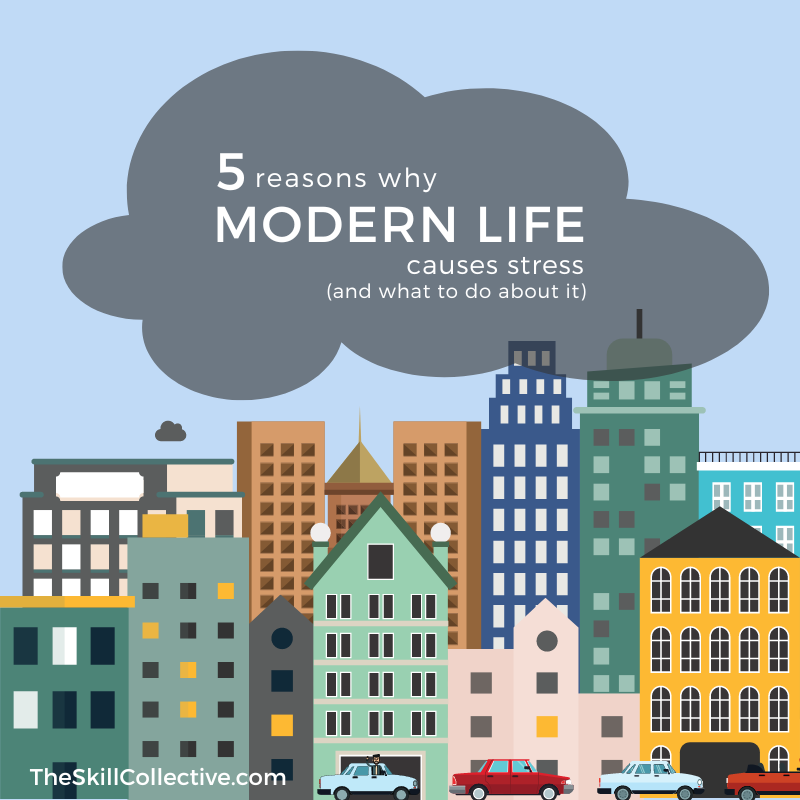

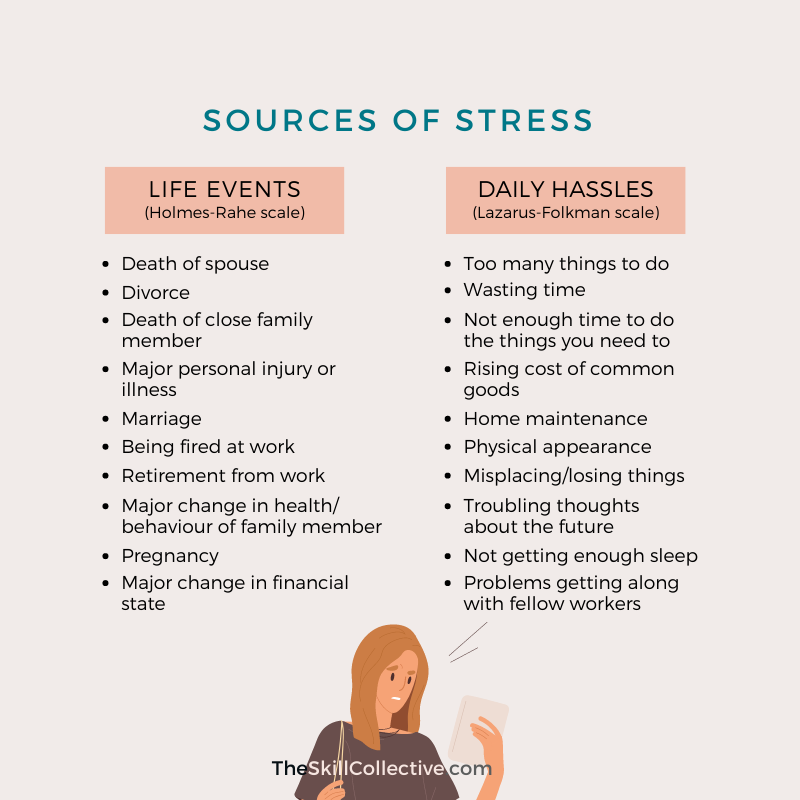
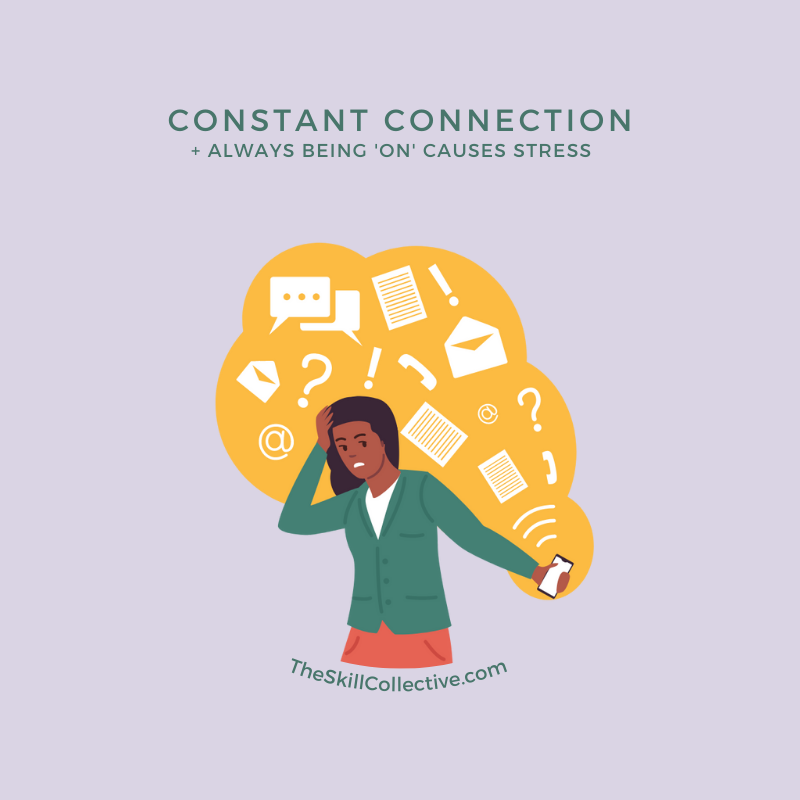

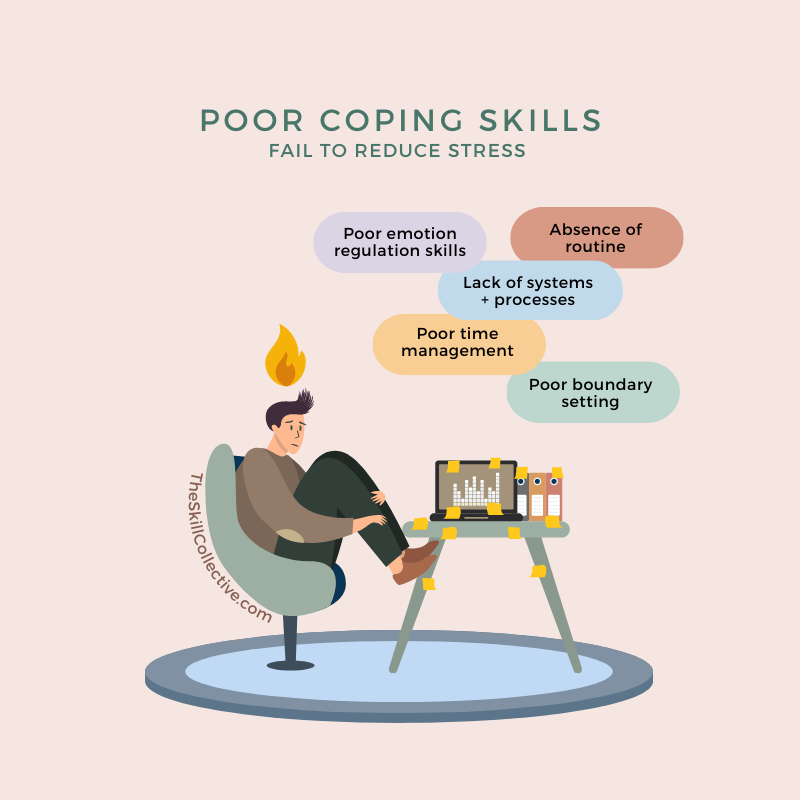
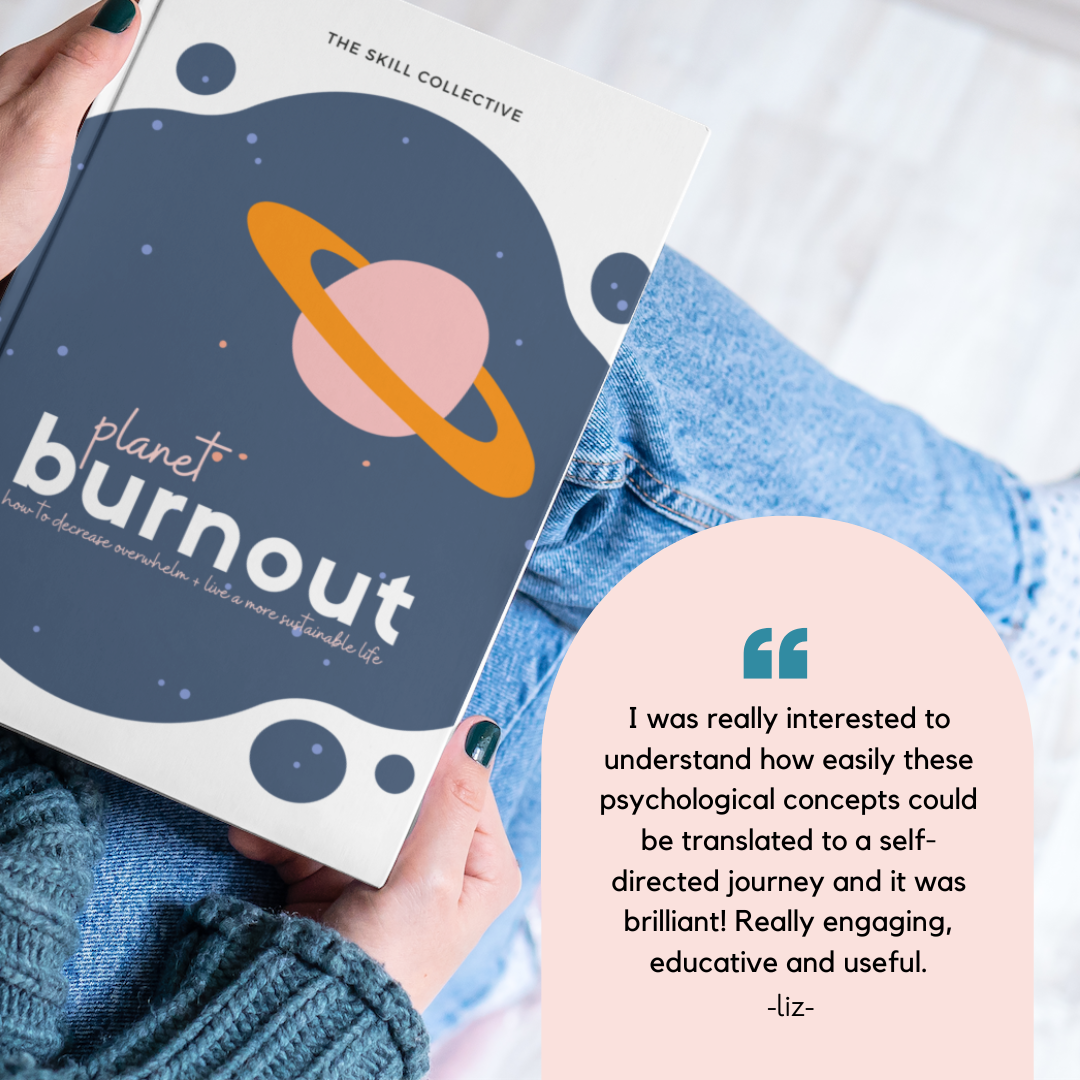












(Updated July 2023) Experiencing stress and burnout? The stressors of modern day and lifestyle challenges may be making things worse. Here’s what to do about it.